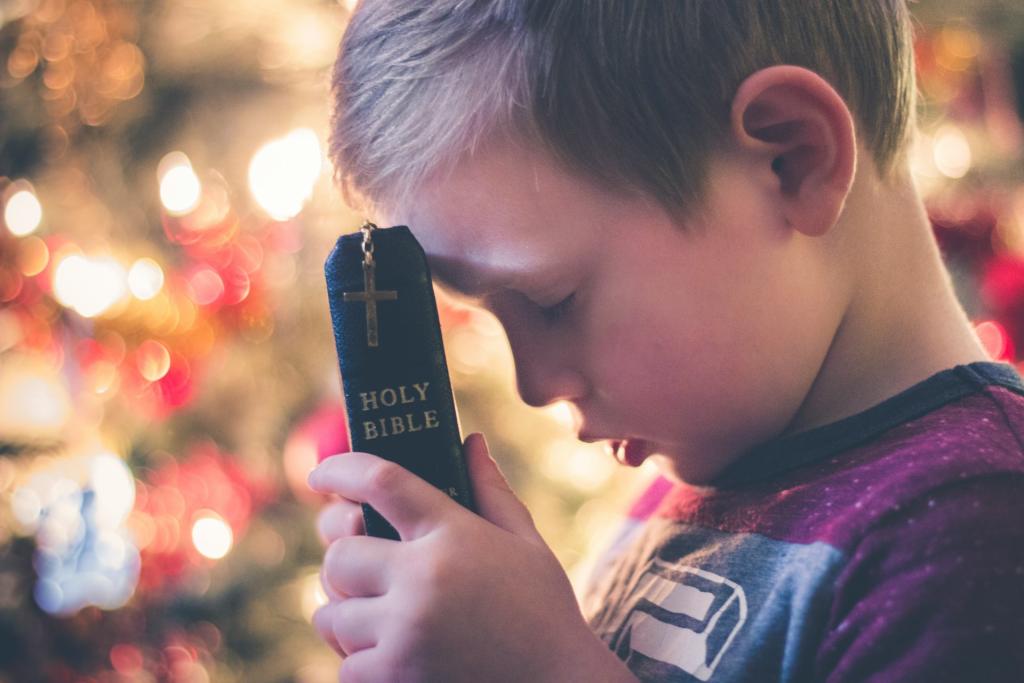Simple Questions About Christian Faith Needing Answers
We learn to cherish and challenge our questions about Christian faith at different times. Not everything in the Bible makes perfect sense to the average Bible reader and churchgoer, but it does create a fascinating study. Some of those probing questions can create tense moments around the dinner table or inside the local church.
For instance, how do you feel when asked the eternally cringe-worthy question, “If God is so loving, why do bad things happen to good people?” There’s also, “If faith in Christ is supposed to be pure, why do so many people die because of it?” Anyone can roll out a scroll of troublesome bullet points that create scratch-head moments to make you bald about what we discover in Christianity.
We have all experienced them, but if someone asks for an explanation, we go to Jesus with an open mouth, and nothing comes out. We know what happened. We can share how it happened. But
why may never get answered this side of glory. Sure, we all go to church hoping a pastor or traveling preacher could bring the trivia. Yet, in reality, those puzzling moments of “Can I lose my salvation?” or “Am I always saved if Jesus really does love me?” can be perilous if we do get those answers.
Let’s cut the tension and take a casual detour from those ultra-serious conversations. Why? That’s something we can answer. Other questions about Christian faith would crack up any pastor or stuffy church elder any day. What are they? I’m glad you asked.
Before we delve into those questions, do you want to stay in touch with the faith-based issues that hit close to home? Subscribe to our free newsletter and never miss what’s being said about the Church and what Christians can say back.
1. Why did Moses write in the third person?
A statue of Moses with the Ten Commandments
Show of hands for anyone puzzled by this one. Imagine being someone who only tells people about your actions with no pronouns. Read the Pentateuch. Moses is the author of those first five books, so why do we read about “Moses” by name so many times? His name appears anywhere from 767 to 852 times in the Old Testament alone, depending on the Bible version that you’re reading. Only arrogant tools who play squash at “the club” refer to themselves by name.
Moses was not
that guy.
To be fair, theologians debate whether Moses wrote those books, but they agree that he was definitely the source of information
as God spoke to him. That’s why references to “Moses” should be inferred as the literal Word of God because that’s how it was shared with either him or another scribe. While that makes sense, tell me Aaron or Miriam was not in the back of the tent shouting grammar lessons that Moses ignored. It’s cringy for Moses to talk about “Moses,” isn’t it?!
2. If Noah’s Ark landed in the Middle East, how did koalas and sloths end up in Australia?
archaeologists and theologians as the location of Noah’s Ark. (Image Credit: @Alex9330 via Shutterstock)
Think about it. When the 150-day flood finally ended, the Ark rested on Mount Ararat (Genesis 8:1-4). The Bible also tells us the mighty ship found its new home on July 17 (approximately 2350 BCE). Every animal, mammal, or fish found its geographic home from there. Many forms of life are germane to only certain areas.
There is
a Garter Snake that can only be found in San Francisco. The
Pinta Island Tortoise is one of the most beloved animals of the Galapagos Islands, thanks to Charles Darwin. A unique bird, the
Kirtland’s Warbler, needs dense jack pine areas, so they are only found in the upper peninsula of Michigan, near the southern tip of Ontario. Maybe these flew, swam, or hitched a ride to get to their “native lands,” but how in the world did the Three-Toed Sloth or the “Whatevs” Koala Bear make it to the Aussie Outback?!
If there was an Uber looking to pick up the Koala and Sloth in Turkiye and waiting to take them to Australia, the driver would be at least 80 generations deep by now—and still waiting for the ride to make it to the car. That’s a mystery never to be solved.
3. Nearly 18,000 gods have been worshipped throughout history, so how do we know we’re right?
It’s a chucklesome question about the Christian faith, but it demands an answer. Consider every civilization, from the world’s first,
the Sumer, to the thousands globally today. The Norse, Greeks, and Romans alone worshiped dozens of gods. Egyptian mythology was populated by around 2,000 gods, and we may still be counting them in Hinduism. The Maori and tribal religions across Africa, and even today’s Wiccan, celebrate the lives of many gods and goddesses.
Almost 18,000 entities have been deified, and
Christians only have one.
How can many millions and millions of people be wrong, and Christians and Jewish people are the only cultures and religions to get it right? Some religions, primarily
Buddhism, determined that gods are not external, so they are non-theistic. And then we have all the mere mortals who have been
suggested they are deities, let alone canonized by the Catholic Church. If someone ever challenges you with this question, it may not feel funny, but that is our faith–
Solus Christus or “In Christ Alone!” Amen.
4. There is no partiality with God, so why did Noah get one pair of animals and seven pairs of others?
Anyone in the South hates mosquitos. They have no use except to bite humans and make us itch. Why couldn’t Noah take off without picking up those pesky insects? From spiders to snakes, bats or cats, skunks, or those creepy, demon-possessed at-night raccoons, there is a loathed creation of God buried in the hearts of every person. “Two by two,” that’s how we’re taught Noah rushed all species into the Ark. Even the bad ones.
Then the Lord said to Noah, “Go into the ark, you and all your household, for I have seen that you are righteous before me in this generation. Take with you seven pairs of all clean animals, the male and his mate, and a pair of animals that are not clean, a male and his mate, and seven pairs of the birds of the heavens also, male and female, to keep their offspring alive on the face of all the earth. For in seven days, I will send raid on the earth forty days and forty nights, and every living thing that I have made I will blot from the face of the ground. And Noah did all that the Lord had commanded him.
Genesis 7: 1-5 ESV
The Ark wasn’t populated by long-term couples with no friends or kids. God called for more animals than others. Noah brought seven pairs of “clean animals” and only two of the “unclean animals” for sustenance and sacrifice. In the words of Mufasa, it’s the “circle of life.” Regretfully, that circle wasn’t a tire that ran over a few million snakes, spiders, and cicadas, but there’s that.
5. If God knows our thoughts, why must we pray aloud?
It’s okay. You can do it.
Isn’t it funny when we are alone and pray in a whisper, or even silently in our mind? Why? Is Satan going to hear what we say, know our plans, and then set up some traps? Don’t laugh. Countless Christians feel that way. Life can be difficult to navigate, and we search for all the shortcuts we can get when we’re desperate for God to move in our lives.
Your parents may have encouraged you to pray aloud if you were raised in a praying household. “Pray out loud. God can’t hear you.” Thanks, Mom, but that’s not quite how it works. It’s like an unwritten rule, like in Baseball or Golf, only not as rewarding. An explanation against giving God the silent treatment is found in Romans:
So then faith comes by hearing, and hearing by the Word of God.
Romans 10:17 NKJV
We should always be in a posture to hear from God and exercise our Christian faith. That’s the fuel we need for righteous living. Praying aloud should strengthen you, not be code in World War II deceiving the Germans. Try it and watch how faith will come by “hearing” what you pray, namely when it’s the “Word of God.”
6. Why do atheists use God’s Name in vain?
Good thing we have a censor button. (Image Credit: @cottonbro studios via Pexels)
Why are God’s and Jesus’ names curse words anyway?! You don’t hear people of any age scream, “Aw, Buddha…or…Muhammad Damnit!” It doesn’t happen, but one errant toe stub and people are calling on the names of the Lord with passion. Despite someone’s faith or serious lack thereof, “GD” and “JC” are usually in high rotation for a sudden impulse to cuss. It’s not that these people care about
Exodus 20:7, but why go there? Maybe because it takes too much time to smack your finger in the door and say, “Oh, I-am-not-convinced-of-your-existence, Damnit!”
The answer may be as real as Jesus’ Name. Any other name of a god, deity, or leader of a religion,
ever, isn’t used in a profane manner. Not Zeus, Joseph Smith, the Great Spirit, Vishnu, or Allah–none are used to swear. Maybe it’s because they are all fictional or expired gods. Only Jesus is real and alive. Only His Father is real. And that is the only avenue people take to swear when they “really” mean it.
7. Why are saved women still punished for what Adam and Eve did wrong?
Yeah, take the cute pictures while you can. (Image Credit: Renan Rezende via Pexels)
The gift of pregnancy feels wonderful only
after the gestation period is complete. Delivering the baby is something only women are strong enough to do. If men had to do it, we’d call in sick and possibly move to an inhabited island. But why do women have to suffer?
Genesis 3:16-20 says the pain in childbirth is because of Eve. In fact, Eve had pain delivering Cain, Abel, and Seth. The pain women have experienced since is “multiplied,” so childbirth pangs did exist. How could it not?
Many other things were cursed, banned, or outlawed in the Old Testament, which is fine to enjoy today. See shellfish (Leviticus 11:10), ripped jeans (Leviticus 11:13-20), tattoos (Leviticus 19:28), no wine in church (Leviticus 12:4-5), not standing when you talk to your grandparents (Leviticus 19:33-34), or even real estate (Leviticus 25:23). We can do all those without conviction, so why is pain in childbirth still a thing? That was a curse under the law, like all those others. Any answers?
I’m positive the
213 million women who are pregnant each year would be interested if any scholars would like to take a crack at this riddle.
8. Why are Father God and Mother Nature always confusing us?
You need more than Christian faith to pick up this cutie. Try BBQ wool gloves. (Image Credit: Tennessee Aquarium via Wikimedia Commons)
Although we don’t live in the Garden of Eden, and life isn’t nestled in a perfect setting, why would natural things on Earth–made from God, most would think–be unhealthy or even deadly for us?
Like, there you are, frolicking on a hike during a vacation in Brazil, and you see this cute little golden or iridescent blue frog. You pick up the sweet frog for a selfie, and within a day, you’re dead. That was
a poison dart frog whose skin is smothered in a “batrachotoxin,” which leads to quick heart failure. One of them can kill 10 to 20 humans. Sweet.
Maybe you live in the British Isles or along the Northwest Coast and are craving an organic meal. You walk to a park and see a squirrel or a rabbit nibbling on some large mushrooms. Cool. You take them home to make a wholesome mushroom risotto, and within minutes, you start convulsing and die. You picked up the “
death cap mushroom” and those cute critters are immune to its deadly fungus that comes from tree roots. You were fooled and now, you’re in the ER because you were hungry.
And, on behalf of all treehuggers, when was the last time you hugged a cactus without excruciating pain? Even worse, hug the Peyote, Fishook Barrel, San Pedro, Barrel, or Cholla cacti, and their poisonous pricklers will have you dead in about a week. So confusing.
9. Since God didn’t want Adam to be alone, why didn’t Jesus get married?
Like the Cristo Rei statue in Lisbon, Portugal suggests, Jesus stands alone. (Image Credit: Motoki Tonn via Unsplash)
It makes sense. God wanted man to have fellowship and someone to help him meet his needs. Yet, despite what some sects and Gnostics believe, Jesus didn’t need or have a girlfriend or a wife. He was fully God and fully man, but if He took a wife, wouldn’t that show favoritism to someone over another? He only had 33 years on Earth, so that would cut a good marriage short anyway. Imagine Jesus making someone a widow. Awful. Jesus could not become “one flesh” (Genesis 2:24) with anyone because the flesh is enmity against God, and His Son knew no sin.
He also didn’t have children because then a single person would have been the heir to Jesus’ work on the Cross instead of all humanity. A wife or a child would not have benefitted Jesus, much like they do for most people today. Not to mention, Jesus’ wife might have gotten frustrated because He was always out late with His friends–only guys. Think about arguments with Jesus Christ. The conversation is escalating, tempers are flaring, and then she says, “Well, you just think you’re perfect, don’t you?”
“Well, honey, now that you mention it…”
10. If failure isn’t good, did God plan on doing it multiple times?
Typically, this is a sign we see on a regular basis. (Image Credit: Kind and Curious via Unsplash)
God, in all wisdom, power, and love, is perfect in action and thought. Yet, many people who aren’t Christian or just making it to the starting line of their journey with Jesus see things differently in the Bible.
- Adam & Eve failed, although the perfect Garden of Eden was their home sweet home
- Noah had to build a big boat for the Great Flood that sort of “etch-a-sketched” humanity
- Everyone wanted to speak the same, so they built the Tower of Babel, but that had to come down
- Sodom and Gomorrah fell because not one person could be won by the Spirit of the Lord, and no one had the chance to repent
This is difficult because empathy should take over for someone who doesn’t know the difference. The argument makes sense, even though God can’t fail. It’s sovereignty over choice, people losing over grace and mercy winning, or even God appoints a leader, like King David, who falls flat on his face. People have choices, and God has plans. His perfect love knows when we fail like David, break down in panic like Elijah, hate Christians and have to recoup their trust like Paul, or have a best friend and lie about him behind his back, like Peter.
God doesn’t plan on failing–He allows us to do so. We learn from mistakes and for our benefit. Life can happen, and it hurts. But God doesn’t fail. That’s why we have faith.










